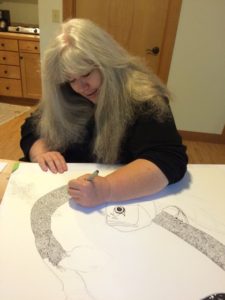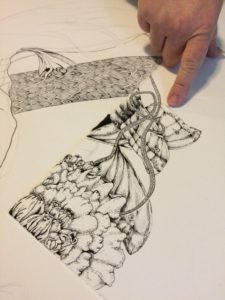Rhonda Davis
Interviewed June 10, 2016 by Alice Taylor, Volunteer
Rhonda, Have you had other residencies? And, if so, how many?
I have not. I just graduated from Wichita State University with a BFA in painting and drawing.
In general, what influences your work?
Connections. I’m a storyteller. I look at the way people connect and disconnect with each other and their environment.
When I was a paralegal I had an interview with a homeless gentleman. At the end, he thanked me for looking him in the eye “like a real person.” He said, “People don’t look homeless people in the eyes.” At that point, I realized that something as simple as looking someone in the eyes and acknowledging their presence either validates or negates them. We have ways of connecting and disconnecting with people and I try to find a way to work them into the images in my work.
Tell me the story of this work of art that you are currently working on.
This is a piece on how we connect and disconnect with the environment. While here, I drove to the ocean and admired all the trees, the greenness. I saw ‘tsunami route’ signs and thought that’s something we don’t see in Kansas. I went around a bend and there were two nuclear stacks popping out of the trees. That was odd because I thought there were earthquakes and plate movement in the area. It struck me as dangerous. I understand now that they weren’t active. It made me realize that with all our good intentions, we sometimes play God when we fiddle with the natural environment. Often, without any thought to the possible ramifications and dangers. I know we have to find alternate energy, but some of these materials have half lives that will far outlive our grandchildren. We have a history of unintended consequences for both the environment and ourselves due to our tinkering. For example, animal mutations around Three Mile Island are staggering and we have not even started to scratch the surface on what the effects will be for humans living around industries that release toxins and chemicals into the environment in everyday circumstances. I am originally from Oklahoma and there is an area around the town of Picher where the residents were unknowingly exposed to dangerous levels of lead and other toxins on a daily basis. As a result, the people had to literally abandon the town where many had grown up. What was once a small community of residents is now a ghost town. Our meddling with the environment can often sever our connections not only to the environment, but often to whole communities as well.
This current piece that I am working on talks about how the land, sky and water are all related. This is a land animal and there is going to be a bird in here. The fish is showing the connection between land and water. The two-headed snake represents Pandora’s Box, good or evil. We have the ability as people to manipulate our environment. Is it fair? What are we doing to the other inhabitants? Do we have the right to do that?
Tell me about the medium.
It is done with Sakura Pigment Pens. When I work, it’s like meditation. I just go. I start in pencil so I can adjust and make any needed changes. Sometimes bodies or people appear as I work while I am thinking of the main theme.
Are you a full time visual artist?
Yes.
What are your other life roles?
I’m a mom to three boys: 21-year-old twins and a 28-year-old. One is a corpsman in the Navy, another is attending college with a major in chemical engineering, and a Marine in the reserves and my oldest works at a factory in Wichita that manufactures gas pumps. My husband is an aerospace engineer. He encouraged me to go back to school. After the boys got out of middle school, he said, “You always wanted to finish your art degree, go back to school.” He has been a huge support system and the one that helps me install all my shows.
Why did you apply to Hypatia in the Woods?
I was attracted to the fact it was a residency specifically for women. I was also attracted to fact that it was time in the woods to think and to just work. I knew it wasn’t going to be Walden, but it was wonderfully remote with easy access to conveniences that I wanted when I needed to take a break from the quiet. The philosophy of Hypatia seemed in tune with how artists create and this rang true for me.
What did you learn about yourself here at Hypatia?
I learned so much about myself. I learned I look for connections with people as well as having this as a theme to my work. I learned that I am prone to overwork – prone to getting distracted and caught up in busyness. I realized I loved having limited internet and phone because it forced me to actually focus on work without all the distractions that I engage in, sometimes as a mindless matter of habit. I also realized how much the conveniences that I thought were making my life easier were just distractions. They take away a lot like watching birds – something I hadn’t realized I missed until sitting on the patio at Hypatia one evening and just “being,” not “doing.” It was a pivotal moment in my realization of how distracted and disconnected I had become. This was also amusing to me because so much of my work centers on connections. There’s a Stellar Jay out there that visited once a day expecting a little bit of fruit that I got in the habit of leaving him daily. Being at Hypatia was a gift of connection to me because it allowed me to realize that I’ve been so busy and distracted with all the busy work of life and in my artistic practice that I haven’t made time to sit. When I get back I have decided that I need to cut out certain things. It has allowed me to think about my values and how I need to realign things.
One of the things I am immensely thankful for is the fact that the cabin was stocked with books poetry and writings of others. I had long forgotten how much I had loved poetry and the visual beauty brought out by the written word. Writing is art brought to life using words, much in the way that drawing, painting and sculpting is the use of line, color and form to communication feeling and thought to others.
You have been at Hypatia for a month now. Do you wish it had been a different length of time and why?
I’m glad I had the full month. A week is too short. I took the first week to just sit outside and just listen. I would not have noticed the trees. I would not have noticed the birds and the way they move. I wouldn’t have noticed how they interact with us. That’s another connection. I recommend that people stay for the full four weeks. It will change the way you see yourself and the natural world.
What place in Holly House did you gravitate to and why?
I can sit on this couch and read the wonderful poetry books here. I used to read poetry when I was in middle school and I loved it. I had not realized how disconnected I was from poetry and how much I miss it. I rekindled a love of poetry while here. It was like coming home to these words. Poetry is a visual as well as auditory art form.
Every morning when I start my day, I sit here at the table and look out the window with a cup of coffee and see the birds. I listen to the wind in the trees and watch these branches move up and down, it is like watching the earth breathe.
Do you have a favorite place on the grounds?
There is a bench that opens up to a little clearing. I like to go there and just listen. I put what I hear on my ‘list of sounds’ so I can figure out how to put them into my imagery. The birds are amazing here.
You may have just answered this. What were the sights, sounds, and smells on the ground that inspired you?
Green. I did not realize there were so many shades of green on the trees, the moss, the texture of the different ferns. The sounds of the birds. Banana slugs – love them. I know everybody hates them. The first night I was here, the next morning I had a banana slug on the porch so I fed it. They are cold and slimy and at the same time like a cat’s tongue. I did not realize how dense the woods are and how loud the silence is.
There are things to discover here.
Are we going to see these things in your work?
You will definitely see them in the work. The current piece I am working on – they’re in there. These 22” x 30” pieces are smaller than I generally work. My last piece was 14 feet long and 3-4 feet in height. Based on these images, I have another scroll in mind that I would like to do when I get home. These images and these words – I will find a way to have them connect to what I am doing. So you will see these again. You will see a lot of these again.
What were you most happy to accomplish at Hypatia?
The best thing was to realize that I have allowed myself to be distracted. I didn’t realize it until I just stopped. When I get home I have to reorder the way I do things. The things I think are priorities are just busy work.
What memory do you want to keep?
The quiet.
What was the one thing that you wish you had brought that you left at home?
(laughing) Have you seen my car? I’m sure I would have twice the gas mileage if I hadn’t brought everything I thought about!
What one thing did you bring that you wished you would had left at home?
I needed my iPad outside the house for reference information. But in the house, Facebook was a huge distraction so I was thankful the access was limited. Having access to the world is only good if it doesn’t cloud your vision.
If you could describe this experience in three words, what would they be?
Quiet. Connecting. Listening.
How would you like the public to respond to the work that you have accomplished here at Hypatia?
My work is about connections. I would like to see what stories my viewers see -how the images that I put on the paper form the stories that they make.
What advice would you offer to women thinking about applying for a residency?
Do it. As women, we tend to fill our days meeting the needs of others. We sometimes need to force ourselves to step back and meet our own needs. We always don’t realize that we need to connect with ourselves. Daily busyness keeps us from asking ourselves hard questions. A residency allows us to figure out who we are.

